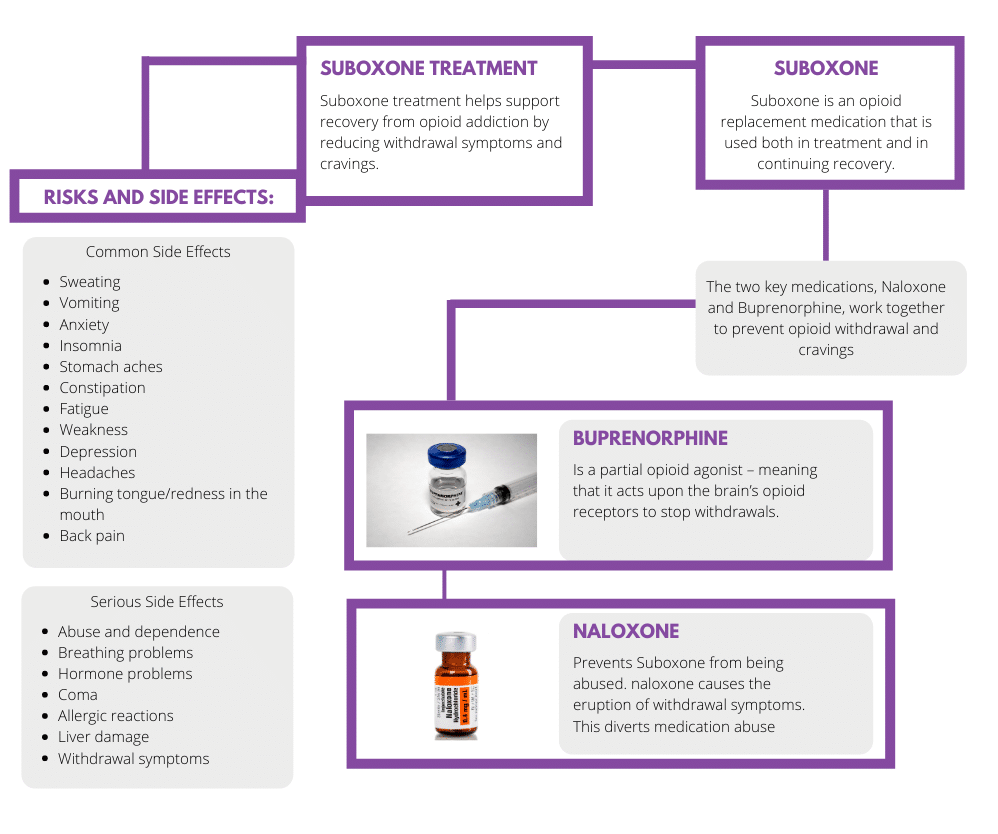In short, Suboxone treatment helps support recovery from opioid addiction by reducing withdrawal symptoms and cravings. However, controversy has surrounded medication-assisted treatment (MAT) in the past, despite overwhelming evidence that MAT really works. Misconceptions about Suboxone treatment lead many people to have a lot of questions about what it is, how it works, and what risks are involved.
Suboxone is a prescription drug containing buprenorphine and naloxone. The drugs work together to assist in treating opioid addiction. Regardless if a person is addicted to illicit or prescription substances, medication-assisted treatment using Suboxone can help. Today, Suboxone is the primary and preferred treatment modality for people who suffer from opioid addiction.
Table of Contents
ToggleWhat You Need to Know About Suboxone
Suboxone is an opioid replacement medication that is used both in treatment and in continuing recovery. Unlike other drugs of this class, Suboxone doesn’t require a specialized treatment center to prescribe it. Instead, any doctor can prescribe Suboxone.
The two key medications, naloxone and buprenorphine, work together to prevent opioid withdrawal and cravings. Buprenorphine is a partial opioid agonist – meaning that it acts upon the brain’s opioid receptors to stop withdrawals. As a very weak opioid, Buprenorphine does this without creating an intense high as other opioids do. Naloxone, on the other hand, prevents this medication from being abused. For example, if a person were to inject buprenorphine and naloxone, the naloxone causes the eruption of withdrawal symptoms. This diverts medication abuse.
Buprenorphine is a Schedule III drug, meaning it has less risk of abuse and dependence than Schedule II substances like methadone, oxycodone, and morphine. Since it was approved in 2002, Suboxone treatment has become a popular and integral part of many opioid use disorder treatment programs. Although Suboxone helps people overcome some of the hardest aspects of early recovery, it’s crucial to find an opioid treatment program as well. After all, relying on Suboxone alone to put an end to addiction is unlikely to make for long-term sobriety.[1]
How Suboxone Treatment Works
Suboxone isn’t a quick fix. In order for Suboxone treatment to be effective, it must be accompanied by a comprehensive addiction treatment program. This means that detox and withdrawal symptoms are only the first step. Patients usually begin taking Suboxone during this phase of treatment before transitioning to an inpatient program.
In order to sustain long-term recovery, most people need counseling and behavioral therapy. After all, both aspects of treatment provide patients with emotional support, professional guidance, and the coping skills needed to stay sober. However, the treatment of opioid addicts is most effective when combined with Suboxone treatment. Instead of being preoccupied with thoughts of getting high, Suboxone takes care of cravings so that individuals are able to focus completely on their program of recovery.[2]
When Suboxone is combined with a comprehensive treatment plan, it offers a long-term solution to opioid addiction. It is used during various stages of treatment both to minimize withdrawals and reduce cravings. In addition, Suboxone can:
- Provide pain relief in patients with chronic or acute pain
- Promote feelings of well-being and relaxation
- Reduce stress levels and anxiety
If a person continues taking Suboxone after he or she leaves treatment, they should attend follow up appointments with the prescribing physician. This ensures that patients are taking their medication as prescribed, staying sober, and still reaping the benefits of Suboxone treatment. Down the line, the goal is to ultimately taper individuals off of Suboxone when they are ready and able to live a substance-free life.
Risks and Side Effects
Although Suboxone treatment is typically safe for people who suffer from opioid use disorder, it does have some risks and side effects. Some more common side effects of Suboxone include:[3]
- Sweating
- Vomiting
- Anxiety
- Insomnia
- Stomach aches
- Constipation
- Fatigue
- Weakness
- Depression
- Headaches
- Burning tongue/redness in the mouth
- Back pain
Many of these symptoms will disappear on their own within a few days. However, if they get more severe or last for several weeks, speak to your doctor. Although it is unlikely, Suboxone may produce more serious side effects, such as:
- Abuse and dependence
- Breathing problems
- Hormone problems
- Coma
- Allergic reactions
- Liver damage
- Withdrawal symptoms
Furthermore, Suboxone may interact with other medications, leading to further negative side effects. Before you visit your doctor, compile a list of any current medications you take. The following medications may interact negatively with the following:
- Benzodiazepines
- HIV treatment medications
- Selective serotonin reuptake inhibitors (SSRIs) and other antidepressants
- Sleeping medications
- Contraceptives
To avoid these risks, discuss with your doctor what medications you can and cannot take with Suboxone.

Suboxone Treatment in Fort Lauderdale
The benefits of Suboxone rehab programs go beyond supporting recovery. Studies have shown that using buprenorphine to treat opioid use disorder is associated with lower rates of relapse, mortality, HIV, and hepatitis C. In addition, it can support better pregnancy outcomes, higher rehab retention rates, and improved quality of life.[4]
Agape Drug and Alcohol Rehab proudly offers Suboxone treatment in Fort Lauderdale as a part of our drug rehab program. Each of our treatment programs are unique and personalized, ensuring that each patient receives the best care possible. If you or a loved one is addicted to opioids, reach out to us today.
References:


